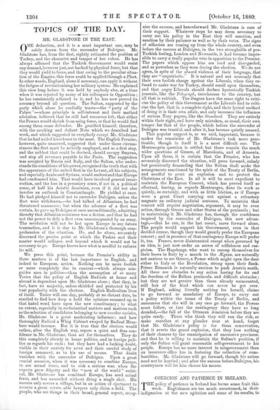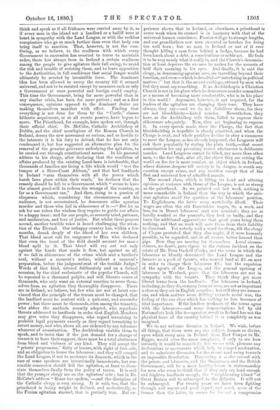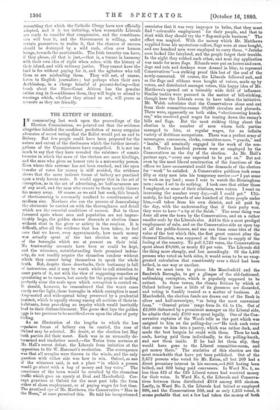COERCION AND PATIENCE IN IRELAND.
THE policy of patience in Ireland has borne some fruit this week. Englishmen are too much accustomed, in their indignation at the new agitation and some of its results, to think and speak as if all Irishmen were carried away by it, as if every man in the island not a landlord or a bailiff were at heart in sympathy with the Land League, or with the reckless conspirators who go so much further than even that body can bring itself to sanction. That, however, is not the case. Owing, as we believe, to the readiness with which every Government in succession has resorted to terror to maintain order, there has always been in Ireland a certain readiness among the people to give agitators their full swing, to avoid the risk and trouble of resisting them, and to leave opposition to the Authorities, in full confidence that social danger would ultimately be averted by irresistible force. The dominant idea has been allowed to sweep the country till it seemed universal, and not to be resisted except by measures such as only a Government at once powerful and foreign could employ. This time the Government, being far more powerful than in any similar crisis, has been far more patient ; and as a first consequence, opinions opposed to the dominant desire are
making themselves manifest with effect. Finding that everything is not done for them by the " Castle," classes hitherto acquiescent, or at all events passive, have begun to move. The Priesthood, for example, have spoken out, through their official chief. Dr. McCabe, Catholic Archbishop of Dublin, and the chief mouthpiece of the Roman Church in Ireland, deems the new movement so serious, and so hostile to the interests it is his duty to defend, that he has not only condemned it, but has suggested an alternative plan for the removal of the genuine grievance underlying the agitation, to be carried out through constitutional means. In his pastoral address to his clergy, after declaring that the condition of affairs produced by the existing Land-laws is intolerable, that thousands of families are living a life which would " test the temper of a Slave-Coast African," and that bad landlords in Ireland " arm themselves with all the power which harsh laws place within their reach," he declares that the remedy should be left to a Government which " seems to have the utmost good-will to redress the wrongs of the country, as far as a Government can." And then, rising to a passion of eloquence which, considering the circumstances and his audience, is not overstrained, he denounces alike agrarian murder and those who fail in abhorrence of it :—" But let us ask for our rulers the wisdom they require to guide our affairs to a happy issue ; and for our people, so severely tried, patience, and moderation, and love of justice. But whilst these prayers ascend, another terrible voice is heard challenging the atten- tion of the Eternal. Our unhappy country has, within a few months, drunk deeply of the blood of her own children. That blood must call for vengeance to Him who declared that even the beast of the field should account for man's blood spilt by it. That blood will cry out not only against the hands that made it flow, but against us all, if we fail in abhorrence of the crime which sent a brother's soul, without a moment's notice, without a moment's preparation, before the judgment-seat of the terrible Judge." Words of that kind, uttered deliberately and on a formal occasion, by the chief ecclesiastic of the popular Church, will be repeated in a thousand pulpits, and will liberate scores of thousands, who only want an external sanction to sever them- selves from an agitation they thoroughly disapprove. There are in Ireland, we believe, but few who are not at heart con- vinced that the principle of the tenure must be changed, that the landlord must be content with a quit-rent, and surrender power : but there must be thousands, even among the tenantry, who abhor the methods recently adopted, who repudiate threats addressed to landlords in order that English Members may give votes they disapprove, who regard terrorising to prohibit legal payments exactly as they regard terrorising to extort money, and who, above all, are sickened by any tolerance whatever of assassination. The Archbishop enables them to speak, and to insist that if the just demand for a change of tenure is to have their support, there must be a total abstinence from blood and violence of any kind. They will accept the " priests' programme," fixity of tenure, with right of free sale, and an obligation to house the labourers ; and they will compel the Land League, if not to moderate its demands, which in the case of some speakers are intentionally immoderate, lest rea- sonable concession should kill the agitation, at least to disso- ciate themselves finally from the policy of terror. It is said that the younger clergy are on the agitators' side ; but in Dr. McCabe's address " Rome has spoken,"—and the discipline of the Catholic clergy is very strong. It is said, too, that the priesthood is losing weight in Ireland, and undoubtedly, as the Fenian agitation showed, that is partially true. But' ex-
perience shows that in Ireland, as elsewhere, a priesthood is never weak when its counsel is in harmony with that of the universal human conscience. Passion will go to strange lengths, and our grandfathers saw men executed in batches for being too well born ; but no man in Ireland or out of it ever thought killing a man from behind a hedge, because he had been harsh about a debt, a conscientious or noble act. He feels it to be very nearly what it really is, and the Church's denuncia- tion at least deprives the excuses lie makes for the assassin of half their meaning in his eyes. And finally, it is said the clergy, in denouncing agrarian acts, are travelling beyond their function, and even—which is dreadful—" interfering in political matters ;" but that is the merest verbiage, uttered by men who feel they must say something. If an Archbishop in a Christian Church is not in his place when he denounces murder committed as a means of becoming more comfortable, who is in his place in this world Argument, however, is not required, for the leaders of the agitation are changing their tone. They have always, they say—and we do not disbelieve them, for they are not bloodthirsty—hated murder. Nevertheless, they have, as the Archbishop tells them, failed to express their abhorrence adequately. Now, they are beginning to express it. In every speech made since the Charge, the fact that bloodshedding is impolitic is clearly admitted, and when the Charge is read, and whole parishes decline to obey a summons to meet the League, as has already happened, the Leaguers will risk their popularity by stating the plain truth,—that secret assassination for any pecuniary reason whatsoever is deliberate murder. Land Leaguers cannot be blind, any more than other men, to the fact that, after all, the object they are setting the world on fire for is more comfort, an object which in Ireland, where distress deepens till society is in danger, is worth any exertion except crime, and any sacrifice except that of the first and universal law of admitted morals.
The second class, which is lifting its bead and uttering opinions at variance with those of the League, is not as strong as the priesthood. As we pointed out last week, nothing is more remarkable in Ireland than the way in which the anti- rent agitators avoid the question of the labourers' position. To Englishmen, the latter seem wretchedly ill-off. Their wages are often the old Dorsetshire wages, 9s. a week, and less, for in Dorset labourers' rent was nominal ; they are as hardly worked as the peasants, they feed as badly, and they have the additional aggravations that good years bring them nothing, and that no work will save them from their liability to dismissal. Yet nobody said a word for them, till the clergy of Cloyne protested that they also ought, if it were humanly possible, to be regarded, and at all events better housed than pigs. Now they are moving for themselves. Local circum- stances, no doubt., gave vigour to the curious incident on the estate of Mr. Penn Gaskell (Cork), and the scene in which the labourers so bluntly denounced the Land League and the farmers as a pack of tyrants, who wanted land at £1 an acre in order to charge their labourers ; but the expulsion of the agents of the League, and the general uprising of labourers in Wexford, prove that the labourers are not in sympathy with the tenants. They think they get more liberal terms from the landlords. The labourers in Ireland, including, as they do, so many farmers' sons, are not as important a class as they are in English counties ; but still they are numer- ous, and when matters seem drifting towards social war, the feeling of the one class which has nothing to lose becomes of vital importance. If the landless workmen of the towns agree with the labourers—and some demonstrations led by old
Nationalists look like it—agrarian revolt in Ireland has not the physical force of the country behind it FO completely as was imagined.
We do not welcome disunion in Ireland. We wish, before all things, that there were any one subject, human or divine, upon which every man in Ireland, from Earl Cowper to Mr. Biggar, would utter the same complaint, if only to see how instantly it would be remedied ; but we see with pleasure any declarations or movements which help to compel moderation,
and to substitute discussion for the recent mad swing towards an impossible Revolution. Discovering a anodes vivendi with
the priests and labourers, and the Orangemen and the British Government, will be a most healthy lesson in statesmanship for men who seem to think that if they only cry loud enough and frighten landlords enough, the " neighbouring island " of Great Britain will be submerged in the Atlantic. It will not be submerged. For twenty years we have been fighting
through evil report and good report, and much more of the former than the latter, to secure for Ire.:and a compromise
resembling that which the Catholic Clergy have now officially adopted, and it is too irritating, when reasonable Liberals are ready to consider that compromise, and the constituen- cies will bear it, and the Government is willing, under certain guarantees, to realise it, that the chances of success should be destroyed by a wild rush, often over human beings, towards the unattainable. The Irish tenantry can have, if they please, all that is just,—that is, a tenure in harmony with their own idea of right when sober, with the history of their island, and with ordinary justice. They cannot have the land in fee without paying for it, and the agitators who tell them so are misleading them. They will not, of course, listen to English journalists ; but perhaps when their own Archbishop, in a charge brimful of peasant-feeling—that touch about the Slave-Coast African has the genuine cattier ring in it—addresses them, they will begin to attend to warnings which, whether they attend or not, will prove as accurate as they are friendly.




































 Previous page
Previous page